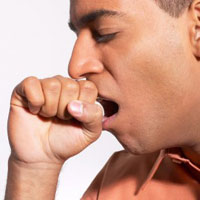The inflammation of the mucous membranes of the bronchial tubes is called bronchitis. It occurs in both acute and chronic forms. If occurring in an athlete, bronchitis is  more likely to be in acute form. Acute bronchitis usually occurs as an infectious winter disease that follows a common cold or other viral infection of the nasopharynx, throat, or tracheobronchial tree.
more likely to be in acute form. Acute bronchitis usually occurs as an infectious winter disease that follows a common cold or other viral infection of the nasopharynx, throat, or tracheobronchial tree.
Secondary to this inflammation is a bacterial infection that may result from the overexposure to air pollution. Fatigue, malnutrition, or the body temperature lowering to a chill could be predisposing factors.
Symptoms and signs:
The symptoms displayed by an athlete with acute bronchitis would be an upper respiratory infection, nasal inflammation and continual discharge, slight fever, sore throat, and back and muscle pain. A cough may signal the start of bronchitis.
At first, the cough is dry, but within a few hours or days, a clear mucous secretion begins, becoming yellowish, indicating infection. In most occasions , the fever lasts 3 to 5 days, and the cough from 2 to 3 weeks. The athlete may wheeze and rale when exhaling. It is possible for pneumonia to complicate matters.
To avoid bronchitis, an athlete should avoid sleeping in areas which are cold or exercise in extreme cold weather, without wearing the appropriate face mask to warm the air inhaled.
Control and treatment:
Involves resting until the fever breaks (subsides), the daily fluid intake of 3 to 4 L of water, and taking an antipyretic analgesic, a cough suppressant, and in the case of severe lung infection, a daily antibiotic.
Listed below are 8 Upper Respiratory Infections
![]() sinusitis
sinusitis
![]() pharyngitis
pharyngitis
![]() influenza
influenza
![]() hay fever
hay fever
![]() infectious mononucleosis
infectious mononucleosis
![]() acute bronchitis
acute bronchitis
![]() bronchial asthma
bronchial asthma
![]() exercise induced bronchial obstruction (asthma)
exercise induced bronchial obstruction (asthma)

























